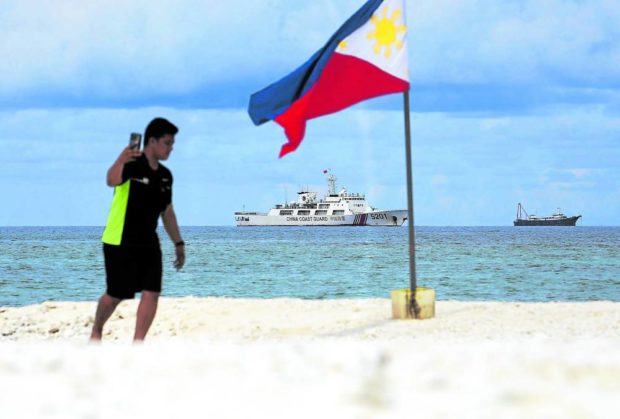Senators warned: Pag-Asa Island as ecotourism zone poses security risk

PH TERRITORY A member of the Philippine Navy, in this June 2022 photo, plants a Philippine flag on Sandy Cay, a sandbar just 7.4 kilometers (4 nautical miles) from Pag-asa Island in the West Philippine Sea where a number of Chinese naval ships have been seen. INQUIRER file photo / MARIANNE BERMUDEZ
MANILA, Philippines — Although they backed the bid to declare Pag-asa (Thitu) Island as an ecotourism zone, several resource persons cautioned senators on Wednesday about the security risks that may arise from doing so as they noted the continuous encroachment of China in the West Philippine Sea (WPS).
At the Senate committee on tourism hearing on Wednesday, Palawan Board member Ryan Maminta said that aside from boosting tourism and employment opportunities in Pag-asa, recognizing the island as an ecotourism zone would also strengthen the country’s claim over the WPS.
“By making it a special ecological tourism zone, the Philippines essentially sends a message to other nations that we intend to keep the WPS as part of our jurisdiction,” Maminta noted.
But he warned that the escalating tensions with China in the WPS may pose a risk to tourists visiting the island.
“We are of the opinion that the continuous patrolling of the Chinese Coast Guard in the West Philippine Sea has the risk of coming across one of the Philippine tourist vessels, which may result in another harassment by China to the Philippines,” Maminta added.
Aris Arzaga, another member of the Palawan Board, echoed Maminta’s sentiments but further pressed that the proposed measure “would strongly demonstrate and assert our sovereignty.”
Pag-asa, some 480 kilometers from Palawan’s capital Puerto Princesa City, is the largest of the nine features occupied by the Philippines in the Spratly Islands. It is a fifth-class municipality in the Kalayaan Island Group with about a hundred civilian residents.
In November 2022, the Philippines sent a note verbale to China after a face-off between the Chinese Coast Guard and the Philippine Navy.
The military said the Navy was towing suspected rocket debris to Pag-asa when a China Coast Guard ship appeared, blocked the boat and “forcefully retrieved” the debris.
READ: Chinese vessel, PH Navy boat face off in Palawan waters
Warned of environmental damage
Maminta had also warned of the possible environmental damage that may be caused by increasing tourism activities in Pag-asa.
“If it is not managed properly, such as in the waste management aspect, it can lead to the degradation of the Pag-asa island cluster,” he said.
With this, Maminta broached the idea of limiting the number of tourists allowed in the island and constructing tourist facilities only in places “less disturbing to animal species living in the area.”
READ: Holding ground, building hope on Pag-asa Island
JPV
Subscribe to INQUIRER PLUS to get access to The Philippine Daily Inquirer & other 70+ titles, share up to 5 gadgets, listen to the news, download as early as 4am & share articles on social media. Call 896 6000.